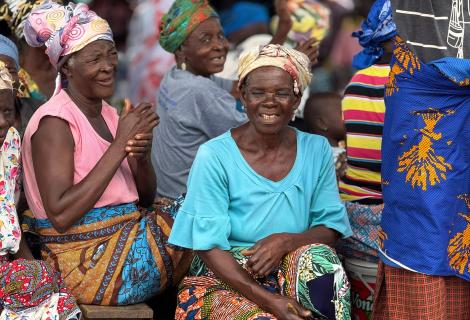Lawmakers Join ActionAid Ghana and Partners on Advocacy Visits to Witch Camps: A Step Toward Survivor-Centered Legislation

For decades, hundreds of women in northern Ghana have lived in isolation and indignity, branded as witches, stripped of their rights, and forced to reside in so-called “witch camps.” These camps serve as painful reminders of entrenched gender-based discrimination, housing mostly elderly and widowed women who have been banished from their communities under the weight of false accusations.
September 17, marked a turning point. A coalition of civil society organizations—ActionAid Ghana, Songtaba, Amnesty International Ghana, The Sanneh Institute, and Oxfam in Ghana—partnered with the Parliamentary Select Committee on Human Rights to begin a three-day advocacy visit to the Gambaga, Kukuo, and Gnani camps. The mission is clear: to amplify the voices of survivors and urge Parliament to urgently pass the Witchcraft Accusations Bill.
Why This Visit Matters
According to ActionAid Ghana’s research, over 800 women currently live in these camps, with more than 70% being widowed and over 60% aged above 60. Many have endured exile for decades, surviving without access to basic necessities such as food, healthcare, or safe housing. The harsh reality is that these women—among Ghana’s most vulnerable are being punished not for crimes, but for unfounded suspicions and deep-rooted superstitions.
The presence of the Parliamentary delegation is a crucial step in shifting policymaking from distant deliberations to evidence-based, survivor-centered action. The lawmakers not only observed conditions but also listened directly to testimonies that reveal a cycle of abuse, neglect, and stigma that no Ghanaian woman should ever face.
Solidarity in Action
At the Gambaga Camp, Members of Parliament made a symbolic gesture by donating an LED screen television and GHS 2,000 to support recreational activities for the survivors. Similarly, they donated GHC 5,000 for the survivors at Gnani Camp and GHC 2,000 for those in Kukuo. While symbolic, these acts signal a broader commitment to recognizing the humanity of survivors and investing in their dignity.
In Kukuo and Gnani camps, survivors courageously shared their painful stories with the MPs. One survivor, Aisha (note her real name), recounted how she had to join the camp to save her life. Others have lived there for over three decades. They spoke about being denied food, healthcare, and reintegration into their families. Their voices made it clear that the fight is not only about ending the camps but also about creating systems of protection, rehabilitation, and reintegration that guarantee dignity and justice.
A Call from Parliamentarians
Members of the committee, pledged their relentless support to see that the Bill process is expedited to end these injustices.
On Day 3, during a stakeholder engagement, the 17-member committee presented its reflections, with eight MPs calling for urgent attention to the health, food security, and protection needs of survivors. These commitments, once supported by law, can transform not only the lives of women in camps but also Ghana’s collective fight against gender-based violence and stigma.
Earlier today, we held a Stakeholder Engagement on Witchcraft Accusations and the Protection of Accused Women to connect and reflect on the pressing issues uncovered during our visits to three alleged witch camps—Gambaga, Gnani, and Kukuo. During the engagement, the Chair of the Parliamentary Select Committee on Human Rights, Hon. Edwin Yaw Anim, outlined the Committee’s next steps:
• Submitting a comprehensive report to the Speaker of Parliament.
• Engaging the Ministry of Gender, Children and Social Protection, as well as other key ministries, on strategies for the reintegration of survivors.
• Following up on the drafting and progression of the Anti-Witchcraft Accusation Bill.
• Intensifying efforts toward the passage of the Bill through sustained parliamentary action.
• Working with the Ministry of Gender to scale up the Livelihood Empowerment Against Poverty (LEAP) Programme for affected women.
• Engaging the Ministry of Health to ensure regular medical check-ups for camp residents.
• Posing targeted questions and drawing the attention of relevant sector ministers to the plight of women in these camps.
• Collaborating with host Metropolitan, Municipal, and District Assemblies (MMDAs) to improve infrastructure and social amenities in the camps.
This strong commitment by Parliament signals a significant step toward justice, protection, and dignity for women accused of witchcraft.
The Urgency of the Witchcraft Accusations Bill
This Bill has a history; it was first introduced under the previous government but stalled at the presidential assent stage. Today, survivors, civil society, and lawmakers are demanding its swift passage. The Bill criminalizes witchcraft accusations and establishes safeguards to protect survivors, ensuring that Ghana moves from rhetoric to decisive legislative action.
The stakes are high. Every day of delay means more women continue to suffer from isolation, hunger, and the denial of rights. Ghana cannot claim progress on gender equality and human rights while such practices persist.
ActionAid Ghana’s Stand
At ActionAid Ghana, we reaffirm that this fight extends beyond merely closing the camps. It is about dismantling a system of fear, exclusion, and stigma that robs women of their dignity. Having witnessed how survivors have demonstrated resilience and courage in sharing their stories with lawmakers, we are now more than ever, vigilantly going to track the process.
The Witchcraft Accusations Bill represents an opportunity for Ghana to position itself as a nation that defends the vulnerable, protects the marginalized, and promotes justice.
We want to reiterate that;
- Parliament must prioritize and expedite the passage of the Bill.
- The government must commit resources to support survivors' healthcare, food security, and reintegration.
- Communities must confront harmful practices and stand against stigma.
Survivors have waited long enough. The world is watching. Ghana must #EndWitchCamps, once and for all.
Written by Jacqueline Parditey.